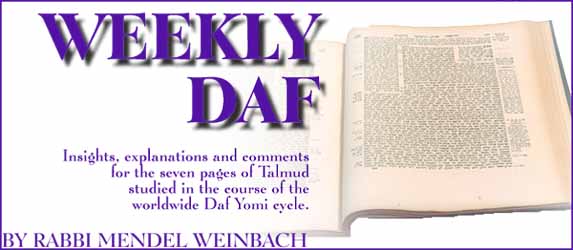Weekly Daf #387
Kiddushin 62- 68; Issue #387
Week of 18 - 24 Tammuz 5761 / July 8 - 14, 2001
This publication is also available in the following formats:
Pulling Strings
A man gives a woman the value of a pruta, the minimum required for making kiddushin, but he makes this kiddushin conditional on his interceding on her behalf with the authorities; if he subsequently fulfills his condition by speaking to the authorities regarding her indebtedness to them, the kiddushin is valid.
This ruling of the mishna does not seem to offer us any new information, asks Tosefot, and should be challenged in the same manner as is an earlier mishna (Kiddushin 60b) as to why it is necessary to repeat the simple principle that a fulfilled condition validates kiddushin. Tosefot answers that we might have otherwise assumed that the woman can claim that she was not satisfied with the way he interceded on her behalf.
Rambam (Laws of Marriage 5:19) adds a couple of words to the description of the man's fulfillment of his condition: The man spoke to the authorities, he writes, and they gave her a break and did not press their claim.
This is understood by one of the commentaries (Korban Netanel on the Rosh) as a paraphrase of the Tosefta cited by Rosh which states that he fulfills his condition by "speaking to the authorities in the manner of interceders." The intent of the Tosefta and Rambam is to communicate that if the man who made this condition only succeeded in gaining for the woman a deferment of payment, it is considered a fulfillment; the woman cannot contest the kiddushin by claiming that she consented to it only because she expected him to achieve total cancellation of her debt. He was required only to "speak in the manner of interceders," and this he certainly did.
Beit Yosef, in his commentary on the Tur Even Haezer (38:12), understood the Rosh as citing the Tosefta as a challenge to the approach of Tosefot, and variations of these approaches appear in the Beit Chadash on Tur (ibid.), Tosefot Yom Tov on the mishna, and Rashash.Kiddushin 63a
Patrilineal Jewishness - A Modern Myth
In a case where one of the parties is not marriageable according to Jewish Law, says the mishna, the child born of their union has the status of the mother; i.e., a Jewish father and a non-Jewish mother - the child is considered a non-Jew.
What is the source for this rule? Rabbi Yochanan, in the name of Rabbi Shimon Bar Yochai, based it on the following passages in the Torah:Intermarriage is prohibited for both a Jewish boy and girl. The consequence of a grandchild being turned away from his Jewish faith is, however, mentioned only in regard to the non-Jewish father but not in regard to the non-Jewish mother. The conclusion is that the child of a Jewish mother and a non-Jewish father is considered Jewish, and the danger of his being diverted from his faith is relevant; while the child of a Jewish father and a non-Jewish mother is considered non-Jewish, and the consequence of his being diverted from the Jewish faith is irrelevant
"You shall not intermarry with them [the non-Jews]; you shall not give your daughter to his son in marriage nor shall you take his daughter as a wife for your son. For - he [the non-Jewish father] - shall turn away your [grand]son from Me and they will serve other gods, and Hashem's anger shall be kindled against you, and you will be quickly destroyed." (Deuteronomy 7:3-4)
.
Kiddushin 66b
General Editor: Rabbi Moshe Newman
Production Design: Michael Treblow
© 2001 Ohr Somayach International - All rights reserved. This publication may be distributed to another person intact without prior permission. We also encourage you to include this material in other publications, such as synagogue newsletters. However, we ask that you contact us beforehand for permission, and then send us a sample issue.
Ohr Somayach Institutions is an international network of Yeshivot and outreach centers, with branches in North America, Europe, South Africa and South America. The Central Campus in Jerusalem provides a full range of educational services for over 685 full-time students.
The Jewish Learning Exchange (JLE) of Ohr Somayach offers summer and winter programs in Israel that attract hundreds of university students from around the world for 3 to 8 weeks of study and touring.
Dedication opportunities are available for Weekly Daf. Please contact us for details.







